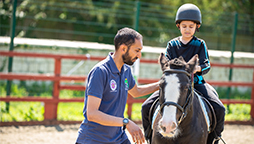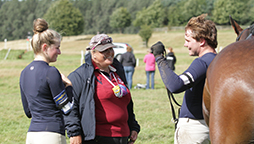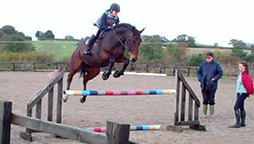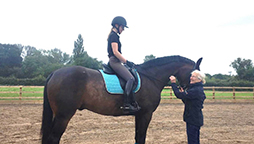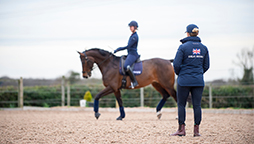Coaching adult participants
While some coaches will specialise in working with one particular participant group, others will work across several different groups over the course of their coaching. The coaches featured on this page are just some of those who are working with adult participant riders of all abilities, from learning to ride to riding for pleasure, training and competing for personal wellbeing and personal goals at a range of levels.
Quick jump to a coach's profile
Pauline Brimson
Caroline Evans
Victoria Hodge
Cindy Russell
pauline brimson
What are your coaching qualifications?
UKCC Level 4, Centre 10 Accredited Coach, BHS Accredited Professional Coach, PGDip in Sports Coaching
WHAT ARE THE MAIN PARTICIPANT GROUPS THAT YOU COACH?
- Adult participation riders
- Adult competition riders
What inspired you to start coaching?
I wanted to help riders to find a better partnership and improved performance with their horses, whether it was a technical maneuver or hacking out alone. I'd been on the receiving end of some pretty grim coaching myself, so I knew there had to be a better way that did not involve the coach standing in the middle of the arena and shouting out what you were doing wrong!
What's your proudest coaching moment?
It's a difficult question because I’ve had so many special moments during my coaching career. If I had to pick one, though, it would be when I asked my riders if they would mind writing a short sentence to go on my testimonial page on my new website. I had so many responses that we couldn’t fit them all on and I was overwhelmed by their words. I had no idea what an impact my coaching had had upon not only their riding, but their lives in general.
How would you encapsulate your approach to coaching?
I've come to understand that riding horses is not just about sitting up straight with your heels down. It’s about adapting and working with what you’ve got, and there's no one-size fits all. As long as the horse and rider are safe and comfortable, and they enjoy what they are doing, then it works for me. I’ve got a bit of reputation for using games and props when I coach – my riders all dread the words “Right then……” when they warm up for their lessons. I might hand them tubes of toothpaste, a ‘magic stick’ or a rubber band! This sort of coaching isn't learnt in a classroom or at a workshop – it's something organic that grows and develops through the years of experience, from trial and error, personal challenges and personal failures.
Have you had to adapt your coaching over the past six months? Do you think it's made you a better coach?
I was in the shielding category, so pretty much confined to my home and my stables for a long period of time. I used my time to record videos of me and my horse doing exercises, which I then put on my Facebook page. My riders gave me suggestions of what they wanted to see, and Taylor and I went out and tried it. I made sure that we showed the 'bad' bits as well as the good!! Riders sent in video clips for me to review and I would give them exercises to try. Anything that stretches and challenges you makes you a better coach and I am going to develop both strategies above to broaden the coaching that I can offer to my riders.
Do you have a piece of coaching advice/wisdom that you feel most riders could benefit from?
There are so many quotes and soundbites that I could use. I suppose my best bit of advice is the one I gave myself when I took my horse out for my first solo ride at Bedgebury Forest. Take it one step at a time – if it's not working, go back a step and try again, but don’t give up. Riding and training horses is all about consistency and repetition – it’s usually the rider who gets bored, not the horse!
What advice do you have for somebody looking for a coach to learn from?
If you know someone who you think is doing well with their riding, ask them who coaches them. You could also go and watch at clinics and shows – especially the warm up area because you'll see far more than in the show ring. Speak to the coach on the phone first and explain what you want to get out of your session. If they don’t seem to understand then try someone else. If you have a session with a coach and it doesn’t work, don’t feel you need to rebook. Instead, keep looking and trying. You're the one in charge, not the coach – they're being paid to provide you with a service to suit you and your horse.
Caroline Evans
What are your coaching qualifications?
BHS Accredited Coach, British Dressage Coach, Pony Club Coach, BHS Stage 3 Coach in Complete Horsemanship, BHS Stage 4 Stable Management, D32/33 Assessor
WHAT ARE THE MAIN PARTICIPANT GROUPS THAT YOU COACH?
- Adult participation riders
- Adult competition riders
What inspired you to start coaching?
Having qualified to teach in further education, as well as gaining my BHS qualifications, I think it was always in me to coach. In running my livery yard over many years, I found that helping those who had bought horses for enjoyment, and helping them to learn how to care and ride them, was all part and parcel of a livery manager. It gives me great pleasure to help and watch people learn and understand.
What's your proudest coaching moment?
There are many, but probably the most often is when a client repeats back to me something they have understood, in their own words, after I've tried many different ways to get them to understand what it is they are feeling or doing – I know then that I've done my job. A single proud moment is one client who originally came to me for a single lesson to see if her rather large Irish horse could physically canter in a 20m x 40m arena – a year later, the pair were Dressage Anywhere champions!
How would you encapsulate your approach to coaching?
I very much teach the rider, and I've found I teach what I now know as the four stages of competence – turning unconscious incompetence into conscious incompetence, into conscious competence, into unconscious competence. Although, I don’t actually describe it like that!
Have you had to adapt your coaching over the past six months? Do you think it's made you a better coach?
I've adapted to video coaching easily. I've always asked clients to text me if they've forgotten something, so I'm used to writing things down for them to practice while I’m not there.
Do you have a piece of coaching advice/wisdom that you feel most riders could benefit from?
Take your time. To get to a stage where you're even aware you need to be more effective in doing something different takes time, and it is after that stage that progression can take place .
What advice do you have for somebody looking for a coach to learn from?
Try different coaches – we all learn a bit from everybody. Different coaches will say things in different ways, which you may find easier to understand.
Victoria Hodge .JPG)
What are your coaching qualifications?
BHS Stage 4 Coach
WHAT ARE THE MAIN PARTICIPANT GROUPS THAT YOU COACH?
- Teenagers of all abilities
- Adult participation riders
- Adult competition riders
If you teach multiple participant groups, do you have a favourite?
My favorite group to work with are the adult participation riders. I've taken many of my clients from doing not very much at all to competing quite successfully in dressage. Because I've had to overcome many injuries and set-backs myself in life, I completely understand the challenges others face with their confidence and I'm able to help them overcome this. I also love their thirst to learn and, because of this, there's loads we can work on together such as test riding, polework, lunge lessons, drill riding and posture analysis, as well as stable management. I also have a few very competitive teenagers who I jump train, and while this is a completely different experience, I also love it.
What inspired you to start coaching?
Being a coach was always my childhood dream, but my life took a different route and I had a very successful international career in the defense and offshore industries. I'd always liked the idea of doing the BHS Stage exams, but never felt I would be good enough.
In 2013, I bought a farm and, quite by chance due to various circumstances, I ended up establishing what is now a BHS-approved livery yard, which was certainly never my plan. I still had no intention to be a coach, but as time went on I had an arena installed and my livery clients wanted to have lessons. Because I wasn’t a coach, they got various instructors to visit, and I was absolutely horrified by what I saw – unqualified, uninsured and uneducated people coming to our yard claiming 'coach' our clients. I quickly banned all outside coaches, passed my Stage 1, Stage 2 and PTT exams, and began coaching myself. I love coaching, so I guess everything happens for a reason, but I’m sad that I waited until I was well into my 30s to do it!
What's your proudest coaching moment?
Having never believed I could ever be a coach for some strange reason, I decided to do my Stage 4, which I passed in 2019 – this was my proudest moment. I have a BA (Hons) in Business Studies and I'm MCIPS qualified, butr achieving the BHS Stage 4 Teach is my proudest qualification. Due to still working full time as a Commercial Manager, I only teach two days a week. I struggle to fit everyone into two days, so I set up a Pole 2 Goal series, which is a monthly polework series of group lessons with different themes each time, with an overall objective of developing each partnership's way of going. I get in excess of 40 people each time I run one of these clinics, and I am extremely proud of this because I think it reflects that my clients share my views and find my methods useful.
How would you encapsulate your approach to coaching?
Participation, diversity and inclusion. It does not matter who you are, what your background is or what type of horse you have – I firmly believe anyone can achieve their ultimate goals and we should all support each other to do this. If someone has a dream, I will support them one hundred per cent and do whatever I can to help make it happen.
Have you had to adapt your coaching over the past six months? Do you think it's made you a better coach?
I couldn't coach during lockdown so I did the following:
- Delivery of Challenge Awards via Zoom. This was a great way to keep all of our clients in touch and maintain morale during this difficult period.
- As part of the challenge awards, I would set tasks for people to perform and post videos on our yard Facebook page so that we could discuss them. Examples are taking a pulse or putting a rug on properly.
- I also set up polework exercises in the arena, then left out worksheets of how these could be utilized and the types of development works that could be done with each polework floor plan.
Do you have a piece of coaching advice/wisdom that you feel most riders could benefit from?
- You will never be perfect, but you'll never stop learning, so just keep developing and improving.
- Life is full of set-backs. Never change your end goal, just develop different methods to get there.
What advice do you have for somebody looking for a coach to learn from?
This is an interesting question because I did my Stage 1, 2 and PTT qualifications with no coach or help whatsoever. However, I trained with someone who I really liked for my Stage 4. She understood my learning style and we just clicked. She pushed me out of my comfort zone just enough to develop me, so I'd suggest looking for someone you like and can trust. In addition, I would recommend that the perspective coach takes every learning opportunity available – shadow other coaches, attend coaching conferences and seminars, read. You don’t have to agree with everything these people will tell you, but understanding why they have that view will vastly develop your own knowledge and experience.
Cindy Russell
What are your coaching qualifications?
MSc Professional Practice in Sports Coaching, PGDip in Sports Coaching, British Equestrian Level 4 Coach, BHS Senior Coach, (APC) Coach Educator, Coach Assessor, Internal Quality Assessor Centre 10 Elite Coach
WHAT ARE THE MAIN PARTICIPANT GROUPS THAT YOU COACH?
- Riders up to the age of 12, of all abilities
- Teenagers of all abilities
- Adult participation riders
- Adult competition riders
- Performance development riders
- High-performance riders
If you teach multiple participant groups, do you have a favourite?
I coach riders from all these groups, although I work with participation riders of all ages for the most part. I very much enjoy working with riders and seeing them find that they can achieve more than they thought was possible. In addition, I enjoy working on performance management with riders both on and off the horse, for competition and for participation.
What inspired you to start coaching?
I've coached since I was in my late teens – it was a natural progression from helping in a riding school where we were always encouraged to support and help other riders.
What's your proudest coaching moment?
There are many moments when I've been proud to have been part of a rider’s pathway to success. For my own path, though, I was proud to be invited to coach endurance riders in India over two seasons, and I was proud to achieve my Masters qualification.
How would you encapsulate your approach to coaching?
Riding should be fun, at every level. Coaching should encourage riders to be the best that they can be, while enjoying the opportunities that they have. I strive to my best for all the riders that I work with.
Have you had to adapt your coaching over the past six months? Do you think it's made you a better coach?
I hope that I'm always adapting and improving my coaching. We can always learn and, by being open to adaptation and learning opportunities, we are more flexible, giving us more options.
Do you have a piece of coaching advice/wisdom that you feel most riders could benefit from?
Make the most of what you're doing while you are doing it. Take your time, and remember to look back occasionally to see how far you have come and how much has changed.
What advice do you have for somebody looking for a coach to learn from?
Look for a coach who has the learner at the centre of what they do. Make sure that you're confident in your coach, and that you build a good relationship with them – their aim should be to see you develop and become the best that you can be. Your learning experience is about you.
